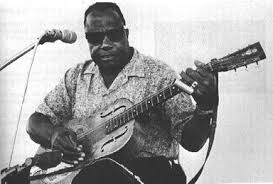Booker T. Washington “Bukka” White was a powerhouse of Delta blues whose raw voice and slide guitar style helped define the genre. Though not as widely known as some of his contemporaries, Bukka White’s music left a lasting legacy. Here are five fascinating curiosities about this remarkable bluesman:
1. He Was B.B. King’s Cousin
One of the most surprising facts about Bukka White is his family connection to another blues legend—B.B. King. The two were cousins, and it’s said that Bukka gave B.B. King his first guitar. While they pursued different styles within the blues tradition, both helped shape the sound of 20th-century American music.
2. He Recorded for the Victor Label in the 1930s
White’s first recordings date back to 1930, when he recorded for the Victor label under the name “Washington White.” These early recordings showcased a mix of blues and gospel, including his distinctive bottleneck slide guitar. Despite their historical importance, these early records did not achieve commercial success at the time.
3. He Wrote Songs from Prison
In the late 1930s, Bukka White served time at Parchman Farm, Mississippi’s infamous state penitentiary, for a shooting incident. While incarcerated, he recorded some of his most iconic material, including “Parchman Farm Blues”, which gives a firsthand account of life behind bars. These songs are considered powerful expressions of blues storytelling and social commentary.
4. He Was Rediscovered During the 1960s Folk Revival
Like many blues musicians of his era, Bukka White faded from the spotlight until the American folk and blues revival of the 1960s. A fan named John Fahey tracked him down using a letter addressed simply to “Bukka White, Mississippi,” which actually reached him! White then began performing at festivals and clubs, introducing his music to a new generation.
5. His National Steel Guitar Became Iconic
White’s instrument of choice was the National resonator guitar, a metal-bodied instrument that gave his music a raw, metallic sound perfect for his powerful slide playing. This guitar became synonymous with his image and sound, and it’s still admired by blues aficionados today. The intense, percussive tone of the resonator guitar helped drive home the emotional weight of his music.
Conclusion
Bukka White may not have had the fame of some of his peers, but his influence on blues music is undeniable. From his prison recordings to his rediscovery decades later, White’s life was filled with the kind of grit, soul, and authenticity that defines the blues. If you’ve never explored his catalog, now’s the perfect time to dive into the raw energy of Bukka White’s music.


Comments are closed